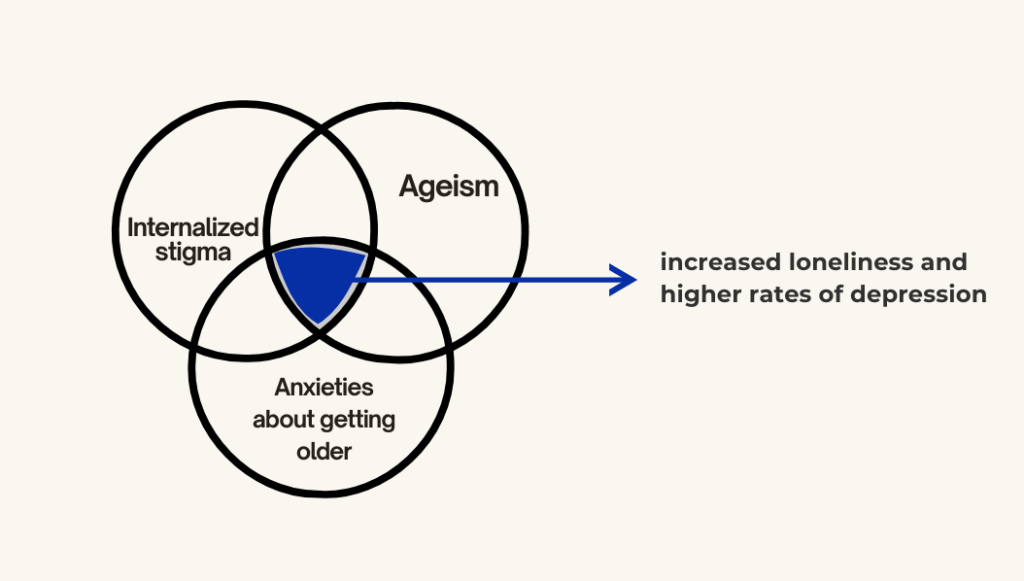Getting Older, Facing More: How Ageism and Being LGBTQ+ Makes Life Harder
Afreen
Getting older is a natural part of life, but judgment and discrimination because of age is not. This refers to ageism, and it’s a significant issue worldwide. According to the United Nations, about half of people globally hold ageist attitudes, which can seriously harm older individuals’ health, social connections, and even how long they live. Moreover, for older queer and trans* persons, ageism intensifies existing issues linked to loneliness, mental health, and prejudice. To fix this, we need coordinated and multipronged efforts based on law and policy and attitudinal changes to build a world that genuinely welcomes everyone.
Ageism at Work in India
In India, ageism is a significant challenge in the workplace. While some studies suggest reported instances (around 15%) might seem lower than global averages, it’s still definitely present. There is a general consensus across all generations that age discrimination must be prevented to make workplaces diverse, equitable, and inclusive (DE&I). Notably, women in India report experiencing more age-related issues at work. The truth is, many Indian workplaces struggle with broader inclusion problems, with employees feeling a lack of diverse leadership and often unable to truly be themselves.
The Randstad India Ageism Report 2024 revealed a striking finding: a substantial 73% of Indian employees have either experienced or witnessed age discrimination, with younger generations reporting this at higher rates. This indicates that age- based biases hinder career progress, learning opportunities, and overall experiences at work. So, there’s an urgent need for organizations to create and implement policies to create environments where all age groups are genuinely valued.
The Double Burden: Aging as an LGBTQ+ Person
The experience of widespread ageism is compounded with an added layer of difficulty of being queer and trans*. This refers to “intersectionality” – where different parts of your identity (like caste, age, and sexual orientation) combine to create unique and intensified—and therefore, intersectional— challenges as you get older. Research shows that older LGBTQ+ individuals often experience worse mental health compared to their heterosexual and cisgender peers. They face higher rates of depression, anxiety, loneliness, and are at an increased risk of suicide.
For example, a qualitative study during the COVID-19 pandemic highlighted the profound sense of marginalization felt by older transgender adults in India who were relegated to a “second priority” in healthcare. They experienced intense stigma and discrimination (both from others and from within themselves in the form of internalized transphobia), and endured profound social isolation. The study pointed out the dual burden of age and being trans*, where ageism combined with transphobia led to feelings of being “othered” and negatively impacted well-being. These individuals also faced serious threats to their survival on multiple levels: physical threats due to a lack of essential resources, emotional threats from isolation and anxiety, and financial threats stemming from the disruption of their traditional ways of earning, which was a direct result of the discrimination they’d faced throughout their lives.
The Psychological Toll on Older Gay and Bisexual Men
Studies focusing on older gay and bisexual men further shed light on the complex psychological challenges of aging within the LGBTQ+ community. The experience of ageism, internalized stigma, and also anxieties about getting older are all connected to increased loneliness and higher rates of depression.

Social factors like class and caste also play a crucial role: lower income acts as a risk factor for poor mental health, while financial stability can offer some protection. Even in India, where strong family structures might traditionally offer support, we can’t ignore the interconnected impact of ageism and homophobia on the mental well-being of older gay and bisexual men.
Addressing the Intersecting Challenges
The combination of ageism and being LGBTQ+ creates significant hurdles to aging successfully. Addressing these challenges effectively means breaking down traditional ideas about gender and sexuality, increasing visibility and legal protection for LGBTQ+ individuals, and putting social policies into action that ensure equal access to healthcare, housing, and jobs, regardless of a person’s age, sexual orientation, or gender identity.
The following recommendations, specifically for India, aim to address these unique challenges and pave the way for a future where everyone can age with dignity, respect, and a sense of belonging:
- Stronger Policies: Develop and implement specific anti-ageism and anti-discrimination policies within healthcare, employment, housing, and social services that explicitly include protections for LGBTQ+ individuals.
- Wider Awareness: Promote widespread awareness and sensitization programs for the general public, healthcare professionals, employers, and legal personnel regarding the unique challenges faced by older LGBTQ+ individuals, tackling both ageism and anti-LGBTQ+ prejudice.
- Targeted Research: Invest in research to better understand the specific needs and experiences of aging LGBTQ+ individuals in India, including their mental and physical health, social support networks, and financial vulnerabilities.
- Inclusive Senior Care: Establish LGBTQ+-affirming senior care facilities and support services that are culturally sensitive and cater to the specific needs of this population, recognizing diverse family structures and chosen families.
- Better Legal Frameworks: Strengthen legal frameworks to uphold the rights and dignity of older LGBTQ+ individuals, covering inheritance rights, partnership recognition, and protection against abuse and neglect.
- Community Support: Facilitate the creation and support of LGBTQ+ senior community groups and networks to combat social isolation and foster a sense of belonging and mutual support.
- Policy Integration: Integrate LGBTQ+ aging issues into existing national and state-level senior care policies and programs, ensuring inclusivity and fair access to resources.
- Intergenerational Dialogue: Promote dialogue and understanding within the LGBTQ+ community across generations to bridge potential gaps and foster mutual support between younger and older members.
- Economic Empowerment: Address the economic vulnerabilities often faced by older LGBTQ+ individuals due to a lifetime of discrimination and limited opportunities through targeted programs.
- Comprehensive Healthcare: Ensure access to comprehensive and affirming healthcare services that address the specific needs of older LGBTQ+ individuals, including both mental and physical well-being.
As India continues its journey towards greater inclusivity and understanding, recognizing and actively addressing the specific needs of its aging LGBTQ+ population is a crucial step.
By embracing policies and fostering communities that value and support individuals of all ages, sexual orientations, and gender identities, India can move towards a future where every elder, regardless of their identity, can live their later years with dignity and respect.
Resources:
- United Nations Department of Economic and Social Affairs (UN DESA). (n.d.). Ageism is a global challenge. Retrieved from https://social.desa.un.org/sdn/ageism-is-a-global-challenge
- Michael Page. (n.d.). Workplace ageism: A top concern despite lower incidence rates in India. Retrieved from https://www.michaelpage.co.in/advice/management-advice/diversity-and-inclusion/workplace-ageism-age-discrimination#:~:text=Age%20discrimination%20across%20generations,in%20their%2050s%20and%20above
- Randstad India. (2024). Ageism Report 2024. Retrieved from https://info.randstad.in/hubfs/Thought%20leadership%20reports/Ageism%20Report%202024%20(1).pdf
- Banerjee, D., & Rao, T. S. S. (2021). “The Graying Minority”: Lived Experiences and Psychosocial Challenges of Older Transgender Adults During the COVID-19 Pandemic in India, A Qualitative Exploration. Frontiers in Psychiatry, 1 11, 604472. https://www.google.com/search?q=https://doi.org/10.3389/fpsyt.2020.604472
- Tsai, A. C., Sevelius, J. M., Operario, D., & Makofane, K. (2020). HIV, sexual risk, and substance use among transgender women in Asia and the Pacific: A systematic review and meta-analysis. Journal of the International AIDS Society, 23(3), e25467. https://www.google.com/search?q=https://doi.org/10.1002/jia2.25467
- Pereira, H., & Banerjee, D. (2021). Successful Aging Among Older LGBTQIA+ People: Future Research and Implications. Frontiers in Psychiatry, 12, 756649. https://doi.org/10.3389/fpsyt.2021.756649
- Kaur, R., Sharma, Y., Grover, S., & Sagar, R. (2022). Perceived age-related discrimination among older adults in India: prevalence and correlates. BMC Public Health, 22(1), 643. https://doi.org/10.1186/s12889-022-13002-5
- NITI Aayog. (2024). Senior Care Reforms in India (Position Paper). Government of India. Retrieved fromhttps://www.niti.gov.in/sites/default/files/2024-02/Senior%20Care%20Reforms%20in%20India%20FINAL%20FOR%20WEBSITE_compressed.pdf
About the author
Afreen’s background encompasses participatory research, health communications, and advocacy. At Safe Access, their work ranges from Sexual and Reproductive Health and Rights (SRHR) and mental health policy, to program tracking, and partnership-building, all aimed at improving health outcomes for the LGBTQIA+ community.
Note: We do not endorse or guarantee the accuracy, completeness, or usefulness of any information provided. Consult your healthcare provider before making any healthcare decisions or changes to your treatment based on information obtained from this platform. In case of a medical emergency or urgent situation, please seek immediate medical attention or contact your local emergency services.
